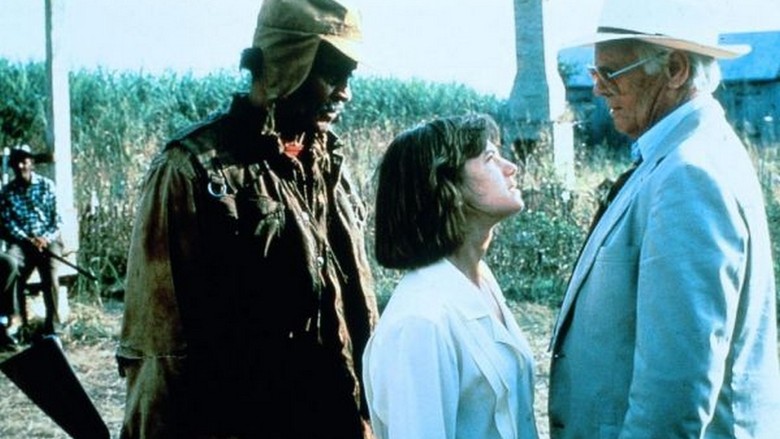 |
| Miss Augusteen Jefferson |
After Gaines' mother and stepfather left for California during World War II, his Aunt Augesteen looked after Gaines and his other siblings back in Louisiana until he followed his parents to California. Of this woman, Gaines continually mentions that even though she could not walk she performed all of the tasks necessary to raise Gaines and the rest of the children under her care. She would slide down the steps of the house and work in the garden. She would cook, clean, and do all of the housework needed. When she needed to discipline Gaines, she would whip him. Gaines says, "She could whip hard. I had to go out and break the switch, bring it to her, kneel down, and get my whipping" (50-51). Since she could not go to other people's houses easily, the people in the quarters would come to her house and gather on the porch to talk, and talk, and talk. Gaines would serve them coffee and listen, taking in their stories and speech.
Along with listening to the people on the porch talk, Gaines read and wrote letters for the people in the quarters. His aunt "made sure" he did this for them. This experience gave Gaines, as Patrica Rickels says, "a feeling for the flavor of their language" and provided him with the sound of the people he wanted to capture (121). Talking about these experiences, Gaines mentions,
I would go to these people and read their letters for them and write their letters for them. In most cases they didn't know how to form the letter. They'd give me a little piece of paper, you know those small, yellow tablets and pencil and say, "Tell Viney" o r"Tell Clara I'm all right. we're doing ok., and the garden's all right." Something like that. Then I would have to form the letter. I'd just write it, and re-write it, and re-write it until I got it right. Then I'd read it back to them. (Rickels 121)Writing those letters, in a way, served as an apprenticeship for Gaines' literary career. They provided him wit the opportunity, just as his aunt's porch did, with getting "the sound of my people talking" down on paper. This, of course, is what we see in his novels.
I want to conclude this post briefly with a quote from Sister Mary Ellen Doyle in regards to whether or not Gaines' Aunt Augusteen is in fact a direct correlation to Miss Jane Pittman or not. Gaines continually states that his Aunt is not Miss Jane; however, his Aunt did serve as the moral model for characters like Miss Jane and Aunt Fe in "Just Like A Tree." As Doyle puts it,
Augusteen Jefferson was the moral model of Jane Pittman and other older women in his fiction; like Jane, she embodied that element of life in the quarters that chiefly caused "J" Gaines to become Ernest J. Gaines the writer--oral tradition. Because Miss Augusteen could not walk, the folk came to her for the visits and long conversations that were their principal recreation. J served them tea or lemonade; he also sat and listened to them talk of old times. (16)The influence of Aunt Augusteen can be seen throughout Gaines' career. As Doyle puts it, her influence helped to move him from being a precocious young boy to the writer and man he is today. She has served as an inspiration for Gaines, and continues to do so, because she showed him how to have dignity and moral strength.
Doyle, Mary Ellen. Voices from the Quarters: The Fiction of Ernest J. Gaines. Baton Rouge: Louisiana State University Press, 2002. Print.
Ingram, Forrest and Barbara Steinberg. "On the Verge: An Interview with Ernest J. Gaines." Conversations with Ernest Gaines. Ed. John Lowe. Jackson: University of Mississippi Press, 1995. 39-55. Print.
Rickels, Patricia. "An Interview with Ernest J. Gaines." Conversations with Ernest Gaines. Ed. John Lowe. Jackson: University of Mississippi Press, 1995. 119-136. Print.





